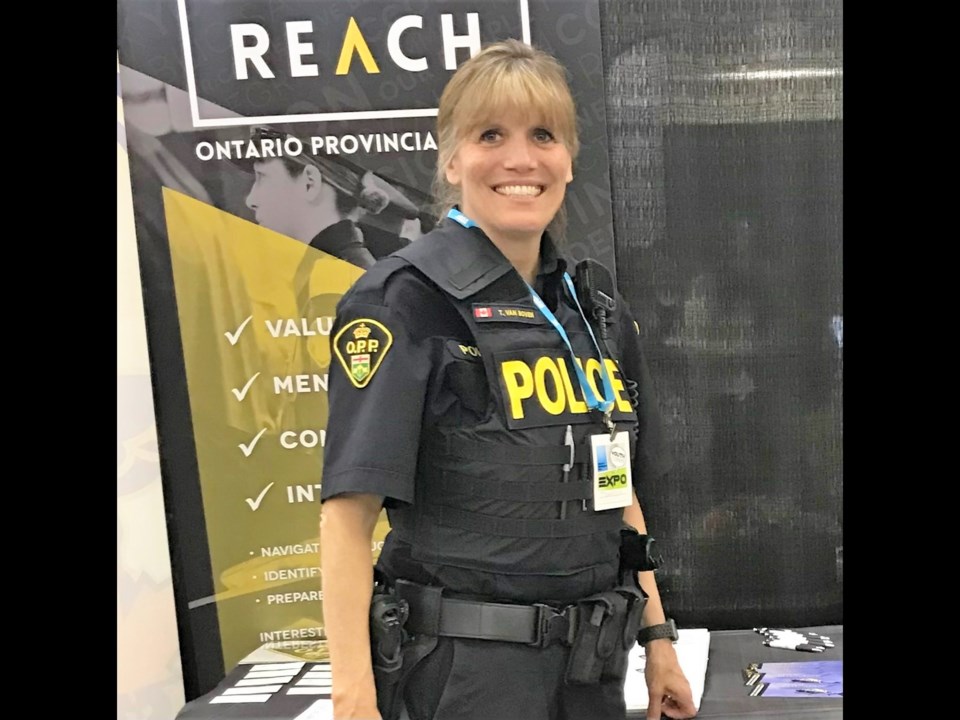While she’s planning to retire this month, a local long-time OPP officer won’t be able to completely stay away from the long arm of the law.
For this week’s edition of People of Collingwood we spoke with Const. Theresa Van Boven, 53, Collingwood OPP school resource officer.
Q: For how long have you lived in Collingwood?
A: Since 1994. I was born in Belleville.
Q: What brought you to Collingwood?
A: My husband. He’s also a retired police officer with the OPP. We met in the OPP in Kingston Township.
He’s a Collingwood boy. His family owned a business here in town, Golden Fish and Chips. He’s an only child so we moved to this area to be closer to them. We’ve been married for 30 years this past January.
Q: Did you always know you wanted to be a police officer?
A: Yes. I started (with the OPP) when I was 20.
From 1989 to 1994, I worked in Kingston Township. From 1994 to 1995, I worked at the Midland detachment. From 1995 to 2000, I worked in Wasaga Beach. From 2000 to now, Collingwood.
When I was in Southern Georgian Bay I worked in sexual assaults with the crime unit, and I did some front-line on-the-road (policing). I also did some work on domestic violence and mental health.
Q: What made you want to become a police officer?
A: My dad is a police officer.
I was always interested in his job.
Maybe because I was exposed to it when I was growing up. I like helping people. I’ve always been interested in trying to make a difference.
Q: You’re currently the Collingwood school resource officer. Can you talk a little bit about that role?
A: I did it for about a year when I was in Kingston Township. From 2001 to 2005 I worked with Collingwood Collegiate Institute and Jean Vanier Catholic High School. (now Our Lady of the Bay)
For the last five years, I’ve been back at those high schools.
I really enjoy working with youth, and I enjoy that connection.
Q: Are there any stories you’d like to share about times in your career when you’ve been able to help someone?
A: There are so many.
Once, there were two students who came from struggling backgrounds. They needed orthodontic and dental work. I helped them navigate through some loopholes and facilitated them getting that work done. There are lots of students who go to guidance who might be struggling with stuff at home or the dynamics of social media. We try to help resolve that so they feel comfortable coming to school and mediating whatever the issue is.
We also run a Youth in Policing initiative. I’ve been able to help some students get summer jobs. We have bursaries for needy students who want to attend post-secondary.
Q: How have the struggles of youth changed over time, in your experience?
A: Social media has certainly changed things.
A lot of people will post things they would never say to someone’s face.
Q: Youth mental health has been an increasing concern due to COVID-19. Is this something you’ve seen as well?
A: Yes. It’s not just due to them not being in school either. It’s not being able to participate in activities, like sports. For a lot of kids, that’s their outlet.
Q: Are you fully retiring at the end of this school year?
A: I am retiring. However, I’m going to return a couple of days a week to help with the courts as a court officer.
Q: Now that you’re retiring, what do you plan to do with your spare time?
A: I love kayaking, canoeing, hiking, camping. I have two Australian Shepherds and I love walking them. I have two children too: my son is with the Canadian Armed Forces and is currently overseas. My daughter is just finishing high school at Collingwood Collegiate.
Q: When you look back over your career, are there any insights you’d like to share?
A: Being respectful and kind to people (is important), especially with youth.
I worked very closely with the Elizabeth Fry Society. They use a diversion method, so instead of putting someone before the courts, you could use (another) option to try to get someone back on the right track. I’ve worked with several Elizabeth Fry Society workers over the years where we’d implement sanctions that would support (people), whether that be through counseling or community restitution.
That’s part of what a police officer’s job is: to find resources in the community to support people.
For our feature People of Collingwood, we’ll be speaking with interesting people who are either from or are contributing to the Collingwood community in some way, letting them tell their own stories in their own words. This feature will run on CollingwoodToday every Saturday. If you’d like to nominate or suggest someone to be featured in People of Collingwood, email [email protected].



